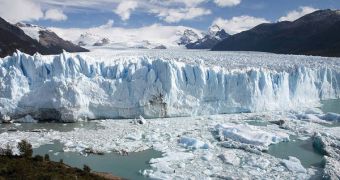Recent investigations have proven that large and seemingly unmovable glaciers can rapidly shrink, in just a few centuries. Researchers from the University at Buffalo came to this conclusion after they analyzed traces left behind by a large ancient glacier, which existed in the Canadian Arctic. They concluded that the impressive mass of ice retreated, and eventually disappeared completely within just a few hundred years, which bears nothing but bad news for existing glaciers in Greenland and Antarctica.
UB paleoclimatologists write in the latest issue of the respected scientific journal Nature Geoscience that the new study is a confirmation of old suspicions, which hold that the coastlines around the world could drastically be reshaped within a few centuries, and that the move could catch coastal communities unprepared. The researchers also underline the fact that, if the same conditions that led to the meltdown of the Canadian glaciers were to reoccur today, they would most likely lead to a significant rise in sea levels, which would endanger many millions of people living near the oceans.
“A lot of glaciers in Antarctica and Greenland are characteristic of the one we studied in the Canadian Arctic. Based on our findings, they, too, could retreat in a geologic instant,” UB College of Arts and Sciences Assistant Professor of Geology Jason Briner explained, quoted by LiveScience. The expert is also the lead author of the new scientific paper detailing the finds. Seeing how global warming and climate change had the potential to significantly alter the planet's landscape in a relatively short amount of time, this research gained new importance, the author said.
“These 'iceberg factories' exhibit rapid fluctuations in speed and position, but predicting how quickly they will retreat as a result of global warming is very challenging,” Briner added. “Because the rates of retreat were so much higher in the deep fjord, versus earlier when it terminated in more shallow waters or on land, the findings suggest that contemporary tidewater glaciers in Greenland and Antarctica that are retreating into deep waters may begin to experience even faster rates of retreat than are currently being observed,” he concluded.

 14 DAY TRIAL //
14 DAY TRIAL //